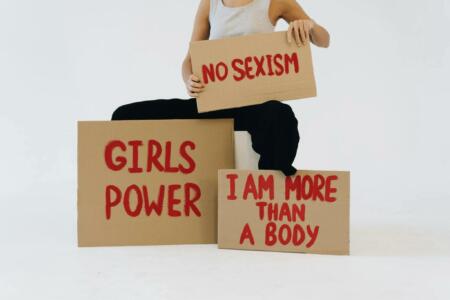Since 1848, the issue of women’s empowerment has become one of the most discussed globally because that particular date was the beginning of the organized women’s rights movement, which in 1920 provided American women with the right to vote. Today, March 8 is International Women’s Day, which is celebrated worldwide and highlights women’s achievements as well as raising awareness about gender inequality in our society.
As this topic is still very much relevant, universities add it to their curriculums to make their learners understand the importance of such a movement and the ideas it had. Moreover, one of the reasons why students study this question today is to shed some modern light on women’s empowerment and see what the modern generation thinks about the movement and the rights women have been struggling for. Still, as the issue has been pretty overdosed with attention at this point, some students consider it boring and exhaustive. Thus, in this article, we will discuss the issue of women’s empowerment and provide you with some ideas on how to research the question in your essay and keep it interesting for your audience as well as enjoying the entire writing process.
Let’s Start With the Empowering Women Meaning
What is the empowering women meaning? The empowering movement had the idea to give females the tools, opportunities, and support they needed to fully participate in the social, economic, political, and cultural life of society. They wanted to remove barriers and ensure that they have the same rights that men do. They also wanted access to education, healthcare, and employment, as well as equal legal protections. Can you just imagine that some time ago, women were mostly excluded from formal education because it was reserved for men? In return, they were trained in domestic skills, while men were prepared for intellectual and professional pursuits.
Can you imagine that the ones who gave birth to new people were not allowed to get quality healthcare? Social norms restricted their knowledge about health and their ability to seek medical care independently. In society, women generally had roles of homemaking, child-rearing, and supporting men. Well, it seems unnecessary to raise the question of granting them political and legal rights, because women were also excluded from voting, public life, leadership, etc. The life of a woman was all about strong social pressures, and it is no wonder that they wanted to change the situation.
Well, the women’s empowerment movement is about creating a society where women are free from discrimination, violence, and exploitation. Today, the question of empowering women concerns not only women themselves but also society as a whole because it leads to economic empowerment, the reduction of poverty, and social progress. Now that women are independent and have the same rights as men, they can inspire future generations and contribute to creating a more equitable world for all.
The Importance of Women Empowerment
As we have already mentioned, the women’s empowerment question refers to increasing women’s social, economic, political, and legal strength. When women are empowered, they gain the confidence and opportunity to contribute significantly to society. This, in turn, leads to stronger economies, more innovative communities, and healthier families.
Today, women can make personal choices, take leadership roles, and influence decisions that affect their lives and those around them. Moreover, women’s empowerment promotes healthier and more educated communities; they are more likely to advocate for education, healthcare, and rights for themselves and their families. And finally, women’s empowerment reduces gender-based violence and promotes social justice and a fairer distribution of resources. Nowadays, women’s empowerment is considered an essential step for achieving global leadership development goals, as it leads to more sustainable solutions for the environment, the maintenance of human rights, and peacebuilding efforts.
6 Influential Strong Empowered Woman
People often need others to get motivated and find like-minded people. The same is true with women’s empowerment. This question is still, let’s say, alive, because new generations get so much motivation and inspiration from idealists in the movement that they want to continue improving the significance of females in society. Thus, if you are interested in the question of women’s empowerment and want to research the issue more thoroughly, we highly recommend learning some information about the following women who significantly contributed to women’s empowerment and did a great deal of work to achieve success.
Susan B. Anthony (1820–1906)
Susan B. Anthony is a co-founder of the National Woman Suffrage Association (NWSA). She did not agree with the denial of voting rights and worked tirelessly for women’s right to vote. Anthony played a crucial role in securing the passage of the 19th Amendment, which granted women the right to vote in the US. Of course, she faced a lot of obstacles, notably ridicule, opposition from the public and politicians, and even arrest. Despite these challenges, she used a women empowerment speech, petitions, and rallies to advocate for societal change.
Malala Yousafzai (1997–present)
Malala Yousafzai advocated for girls’ education in Pakistan, where girls were denied schooling by the Taliban, through public speaking, writing about the need of women empowerment, and activism. She lived under Taliban control and was shot. Nevertheless, she survived and has continued her fight for education from abroad by speaking on global platforms and became the youngest Nobel Peace Prize laureate in 2014.
Gloria Steinem (1934–present)
Gloria Steinem was a leader in the feminist movement and co-founder of Ms. Magazine. She advocated for reproductive rights, equal pay, and the end of gender-based violence. Gloria was frustrated with societal limitations on women’s rights and lack of representation. As a result, she became an iconic figure in the second-wave feminist movement in the US, helping shape modern feminism. Gloria faced much criticism from conservatives, harassment, and media scrutiny.
Rosa Parks (1913–2005)
Rosa Parks was known for refusing to give up her seat on a bus in Montgomery, Alabama. She wanted to challenge racial and gender-based injustices, particularly in the segregated South. Her courage led to the Montgomery Bus Boycott and the eventual desegregation of public transportation. Rosa was one of those who faced a great deal of racial discrimination and threats of violence yet overcame these obstacles with resilience and became a symbol of resistance.
Hillary Clinton (1947–present)
Hillary Clinton was a First Lady, Senator, Secretary of State, and presidential candidate; she promoted gender equality, healthcare reform, and women’s empowerment globally. She aimed to create a more just society. Hillary integrated women’s rights into US policy and became the first woman nominated for US president by a major party. Constant criticism, gender bias, and political attacks were the most frequent obstacles she faced. Yet, despite numerous setbacks, she built a career in public service and continued her advocacy for women’s rights.
Frida Kahlo (1907–1954)
Frida Kahlo was a renowned Mexican artist. In her work, she explored themes of gender, identity, and the female body. As you can see, Frida was passionate about expressing women’s struggles, pain, and identity through art. She challenged traditional gender roles, inspired future generations of women artists, and became a feminist icon. Kahlo underwent many challenges in her life, and she expressed her pain in her artwork.
6 of the best women empowerment quotes that sound like affirmations today
There are many motivational quotes and positive affirmations concerning women empowerment meaning, but let’s take a look at those female empowerment words that are still renowned among modern generations and what messages they have brought to society.

- “I am not free while any woman is unfree, even when her shackles are very different from my own.” – Audre Lorde
These women empowering words say that the interconnectedness of women’s liberation and solidarity across different struggles is essential.
- “A girl should be two things: who and what she wants.” – Coco Chanel
Women should define themselves on their own terms. Self-confidence is what women need.
- “I do not wish women to have power over men, but over themselves.” – Mary Wollstonecraft
Women’s empowerment is about self-sovereignty, not domination over others.
- “I’m tough, I’m ambitious, and I know exactly what I want. If that makes me a bitch, okay.” – Madonna
Women should embrace their ambitions without worrying about societal labels.
- “You don’t have to be pretty. You don’t owe prettiness to anyone.” – Erin McKean
McKean challenges beauty standards, emphasizing that women are not obligated to meet society’s appearance-related expectations. If a girl wants to be bold, she definitely can.
- “In the future, there will be no female leaders. There will just be leaders.” – Sheryl Sandberg
These empowering women words say that in the future, leadership should not be defined by gender but by capability. Female leadership is also okay!
10 Topics for Women Empowerment Essays to Cover Today
Here are some solid women empowerment topics that could be an excellent basis for your next piece of college writing.

- “The Rise of Female Gamers: How Women Are Shaping the Future of Esports”
- “Redefining Body Positivity: How Young Women Are Challenging Beauty Standards in 2024”
- “From Victim to Victor: How Female Survivors of Violence Are Shaping Policy Change”
- “Beyond the Hashtag: How the #MeToo Movement Continues to Evolve Among Gen Z Women”
- “Ecofeminism in Action: Women Leading the Global Fight Against Climate Change”
- “The Empowerment Paradox: Are Women Truly Liberated in the Era of ‘Girlboss’ Culture?”
- “Women in Cryptocurrency: Pioneering Financial Women’s Independence in the Digital Economy”
- “Pop Culture and Empowerment: Are Female Superheroes Helping or Hurting Gender Equality?”
- “Breaking Taboos: How Women Are Leading Open Conversations on Mental Health in 2024”
- “Sexual Empowerment vs. Exploitation: Navigating OnlyFans and Digital Ownership for Women”
How to Write Essay: Women Empowerment
As with any other essay, the essay “Women Empowerment” will have some essential parts: an introduction, a body, and a conclusion. Now, we will discuss some tips to help you craft a masterpiece when writing your essay on such a tricky topic.
Introduction
It is essential to start your essay on women’s empowerment with a clear, compelling introductory sentence. You can define “women’s empowerment” and provide context for why it is crucial today. Then, center your essay around a narrower women empowerment topic. The women’s empowerment issue is quite large, and you have to shed some light on the unique perspective you are going to discuss. For example, you can talk about the significance of gender equality today, the barriers women face, the progress made in specific fields, etc. Keep in mind that it is very important to avoid vague statements—focus on specific areas like education, politics, or economics and how empowerment affects them.
Body
Make sure that your arguments are well-structured and supported by credible data or examples from women empowerment articles, for example. It is enough to focus on three to four strong arguments and back each one up with solid evidence. 100-150 words are okay for an argument, providing enough depth without overwhelming the reader. Start each paragraph with a clear topic sentence and avoid overgeneralizing or making unsupported claims.
Dos and Don’ts in your “Women’s Empowerment” essay
- Focus on specific issues (pay equity, reproductive rights, access to education)
- Discuss challenges and solutions contributing to the positive outcomes of empowerment efforts
- Use examples of empowered women from various fields (business, politics, activism)
- Include global perspectives
- Avoid vague statements such as “Women are strong” without explaining why
- Don’t rely on stereotypes or make overly emotional appeals without evidence found, for example, in an article on women empowerment
- Avoid writing from one perspective and failing to consider diverse viewpoints
Conclusion
Summarize the key points of your essay, but don’t repeat them. Avoid ending with overly simplistic statements; instead, offer a forward-looking perspective.
A 150-Word Example Women Empowerment Essay: Narrative Paper
“A Letter to My Younger Self: Embracing the Power Within”
Dear Younger Me,
I remember the days when you felt invisible, standing in the shadows while others shined. You often doubted your worth, comparing yourself to the perfect images plastered across magazines and social media. You were so focused on fitting in that you forgot the power that lies within you.
One day, during a school assembly, a teacher spoke about the strength of women who fought for their rights. Her words ignited a spark in you. You began to realize that empowerment isn’t just about being loud; it’s about owning your story. You started writing, sharing your thoughts and dreams, and in doing so, you found your voice.
Each time you face challenges, remember that they shape you. Remember that you are unique, and trust in your strength. You have the power to inspire others. Hold onto that spark and let it guide you.
With love,
Your Future Self
A 300-Word Example Women Rights Essay: Argumentative Paper
“The Impact of Campus Culture on Women’s Empowerment: Navigating Safety, Mental Health, and Leadership Opportunities”
The culture on college campuses significantly influences women’s empowerment, particularly regarding safety, mental health, and access to leadership opportunities. Despite the progress made in gender equality, female students face numerous challenges that hinder their professional and personal growth. Universities must address these issues proactively, fostering environments where women can thrive.
First, safety on campus is a critical concern. Statistics show that one in five women experiences sexual assault during their college years. This alarming reality creates an atmosphere of fear, discouraging women from fully participating in academic and social life. Universities must implement comprehensive programs that educate students on consent, provide robust support systems, and ensure transparent reporting processes. By prioritizing safety, institutions can empower women to engage more freely and confidently in campus activities.
Mental health is another vital aspect of women’s empowerment in higher education. Many female students report higher levels of anxiety and depression due to societal pressures, academic expectations, and personal safety concerns. Universities should expand their mental health services, ensuring accessible resources and support networks explicitly tailored to women. By prioritizing mental well-being, campuses can cultivate resilience and empower women to navigate challenges effectively.
Finally, access to leadership opportunities remains uneven, with women often underrepresented in student government and organizational roles. Institutions must promote initiatives encouraging female participation in leadership positions, such as mentorship programs and workshops. Empowering women to take on leadership fosters a sense of agency and encourages others to follow suit.
The campus culture significantly impacts women’s empowerment. By addressing safety, mental health, and leadership opportunities, universities can create inclusive environments that empower female students and contribute to a more equitable society. Educational institutions must take a stand and implement strategies that foster women’s empowerment, paving the way for future generations.
FAQ
What is a women empowerment short essay?
It is a brief piece of writing about empowering women by giving them equal rights, opportunities, and access to societal resources. It presents the need to dismantle gender-based barriers, ensuring women’s participation in all spheres of their lives.
What is female empowerment?
It gives women the autonomy to make life decisions, access education and economic opportunities, participate in society, etc. It breaks down societal, legal, and cultural barriers that some time ago restricted women and disallowed them from achieving equality with men.
Why women empowerment is important?
Empowering women is essential because it leads to greater social, economic, and political equality. It promotes the reduction of poverty, boosts economic growth, improves community health and education, and strengthens democratic participation, creating a more balanced world for everyone.




